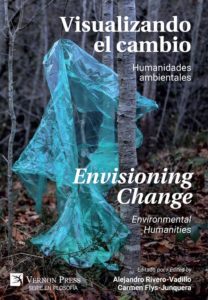Edited by Carmen Flys-Junquera and Alejandro Rivero-Vadillo. Vernon Press, October 2020. ISBN: 9781648890376
 The 21st century has been described by many environmental scholars as the one in which humanity will need to face its greatest challenge. The diverse ramifications of the climatic crisis are perhaps the most evident proof of this. This dual-lingual multiauthor volume reflects different perspectives of envisioning an eco-social change towards a more sustainable and just society. Musings on the philosophical implications of utopias, ecofeminism, biopolitics, and biomimicry come together with photography and participatory documentaries.
The 21st century has been described by many environmental scholars as the one in which humanity will need to face its greatest challenge. The diverse ramifications of the climatic crisis are perhaps the most evident proof of this. This dual-lingual multiauthor volume reflects different perspectives of envisioning an eco-social change towards a more sustainable and just society. Musings on the philosophical implications of utopias, ecofeminism, biopolitics, and biomimicry come together with photography and participatory documentaries.
Envisioning Change: Environmental Humanities opens with an essay from one of Spain’s foremost essayists on environmental philosophy, Jorge Riechmann. Literary analyses run from classic myths to oral traditions, including references to frequently neglected traditions such as Bhutan or Croatia, in addition to Spain and the United Kingdom. Rather than emulate theoretical and overarching studies, as several of the recent books on environmental humanities, this volume has many original features, including the abundant references to myths and chapters on eco-translation.
This volume reflects a wide variety of approaches and particularly highlights the search of younger scholars for new approaches to envision a better world. It would hold appeal for scholars, researchers and teachers interested in the environmental humanities from either a philosophical, literary or artistic perspective. Moreover, environmentalists, activists, artists, and local politicians may also be interested in how the humanities can contribute to the wider environmental cause.
*******
El siglo XXI ha sido descrito por muchos académicos medioambientales como el siglo en el que la humanidad tendrá que enfrentarse a su mayor reto, y la prueba más evidente quizás sean las ramificaciones de la crisis climática. Esta colección bilingüe refleja perspectivas diferentes de visualizar un cambio eco-social hacia una sociedad más justa y sostenible. Reflexiones sobre las inferencias filosóficas de las utopías, el ecofeminismo, la biopolítica y la biomímesis se juntan con fotografía y documentales participativos.
“Visualizando el cambio: Humanidades ambientales” comienza con un texto escrito por uno los ensayistas sobre filosofía ambiental más importantes de España, Jorge Reichmann. Los análisis literarios van desde mitos clásicos a tradiciones orales, incluyendo referencias a tradiciones frecuentemente olvidadas como las de Bután o Croacia. En lugar de imitar estudios teóricos y globales como han hecho libros recientes que versan sobre humanidades ambientales, esta colección tiene varias características originales, que comprenden abundantes referencias a mitos y capítulos sobre eco-traducción.
Esta colección refleja una amplia variedad de enfoques; destaca la búsqueda de nuevas perspectivas para visualizar un mundo mejor por jóvenes académicos, y será de interés para académicos, investigadores y profesores interesados en las humanidades ambientales desde puntos de vista filosóficos, literarios o artísticos. Además, ecologistas, activistas, artistas y políticos locales pueden encontrar información sobre cómo las humanidades pueden contribuir a la causa medioambiental.
